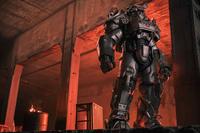
Tom Bissell just published a provocative and really long piece on iPad gaming called "Beyond Angry Birds" over at Grantland. You might have read his stuff before: he wrote The Father of All Things, an excellent memoir about his father's service in Vietnam, and last year published "Video games: the addiction," a truly mind-blowing article for the Observer about his simultaneous addictions to Grand Theft Auto and cocaine.
Bissell makes some complicated points about the future of console gaming and tries to make a case for how much fun he's been having playing games on his iPad. If you've got time, you should read the whole piece but we'll hit some highlights here.

Console game makers are starting to feel the pinch. Bissell quotes some alarming statistics about the sales performance of several high-profile and well-review games released this year; Bulletstorm, Dead Space 2 and Shadows of the Damned have done poorly and even recent hits like L.A. Noire and Portal 2 have performed below expectations.
Game developers are getting nervous. The production value that goes into a high-profile console game requires a lot of engineering and designer manpower that cost a huge amount of money. The budgets for current games are based on past sales history, so a few underperformers can completely screw a company's bottom line.
This starts to sound like the music business in the 90s, a time when everyone was using CD profits to record elaborate albums in expensive studios with even more expensive production and engineering talent. No one was prepared for a day when consumers would ditch hifi audio for tinny earbuds and start buying their music one track at a time instead of on $19 aluminum discs.
Bissell rightly identifies mobile platforms as the tinny earbuds of the gaming industry and tries the see the bright side of gaming's own lofi future:
Console games do everything in their power to form a relationship with you, which can be great and rewarding and, just as often, aggravating and tedious. iPad games, on the other hand, are like someone you meet in a bar and find yourself screwing in the bathroom 10 minutes later. This is not a criticism.

He goes on to detail his experiences with a long list of iPad games. After starting with Grand Theft Auto: Chinatown Wars (remember, he's an expert), he examines Dead Space, Mirror's Edge, Helsing's Fire and Flight Control. He makes the best case for World of Goo and Sword & Sorcery but even several thousand words can't explain away the touchscreen controller issues that plague (and seem forever doomed to plague) both iOS and Android games. In the end, he's even describing the pleasures of throwback choose-your-own-adventure games like Surviving High School and a sim game called Game Dev Story.
iPads and iPhones are awesome for physics games like Angry Birds (and its ripoffs: Cut the Rope and Tiny Wings don't suck) and it's amazing for Scrabble (even if that's not really the kind of game we're talking about here). Anything ported from a console (or designed to mimic a console game without actually violating copyright) just feels wrong.
The bigger issue comes when gamers get used to paying $1 or $5 or $10 for a game on their mobile device and balk at coughing up $60 for console games. That already seems to be happening and game companies won't be able to maintain the current production values in a world where games cost less than $20.
Maybe Tom Bissell is just staying ahead of the curve, making peace with a new world where the latest PS3 games have the kind of shoestring budgets that have killed off almost all the big time rock albums in the 21st century. It's a pretty depressing future to consider, no matter how well Bissell can write about it.

Finally, the piece showed up at Grantland, a new website started by ESPN in an attempt to keep star writer Bill Simmons happy. Since Bill likes to talk about movies and records and comics as video games when he's supposed to be writing about sports and they've never figured out a way to use him on TV, the bosses decided to let him hire some (pricey) friends like Malcolm Gladwell, Chuck Klosterman and Dave Eggers and see if they can generate an audience and make money with long articles and a minimum of those annoying ads.
The chin-scratching and over-explaining that dominates Grantland feels like the direct opposite of the short bursts of shouting that ESPN usually demands from this on-air jocks. I'm not complaining: it's great to see people get paid to do ambitious work (see "video game budgets" discussion above), but it's hard to imagine the suits at headquarters having much patience if Grantland ends up generating less income than 2am reruns of Missouri Valley Conference basketball games.



